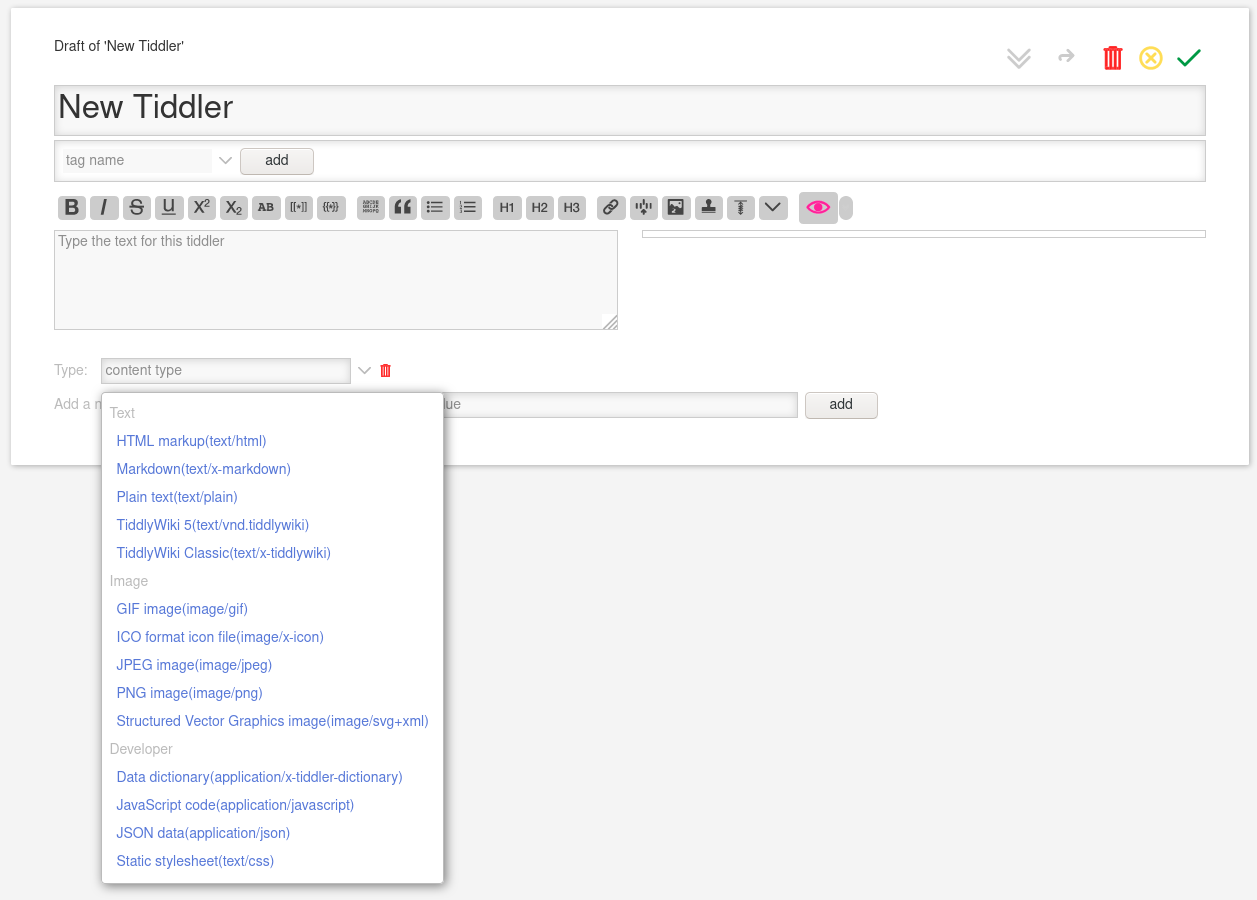Introducing TiddlyWiki
TiddlyWiki is a personal wiki and a non-linear notebook for organising and sharing complex information.
- personal wiki: it’s your own. This is by no means a collaborative software.
-
non-linear notebook: there is no enforced hierarchy, and no need for careful planning, it will adapt to your thoughts

- organising: using tags, links and plug-ins, TiddlyWiki brings intuitive and effortless organisation
- sharing: it’s easy to share parts of your wiki, create links, etc.
This new service, available on demand for our members, can be assimilated to a wiki solution with a very high level of flexibility, automatic cross-referencing and a world of possible customisations baked in. The purpose of TiddlyWiki is to provide us with a way to keep and organise our thoughts into notes.
This makes for a fairly difficult start if like me you are used to traditional wiki solutions. However, the ultimate goal of having a solution which eventually will fit much closer to your way of thinking may (hopefully!) be well worth spending a few hours reading the various manuals and tips available online.
From what we gathered, if you happen to be fluent in Javascript language, then your possibilities of tuning TiddlyWiki exactly the way you want it are enormous.
How does it work?
TiddlyWiki is an old project, which was first released in 2004, back to the Iron age of the Web. Yet, it’s still around and has evolved over the years, with a strong and steady community of users.
Now in version 5, after a full rewrite of the original code, TiddlyWiki is a responsive and modern application running in the Web browser with zero dependencies to any other technological stack. As a matter of fact, the whole wiki is contained within a unique HTML document of a very decent size (2.4 MB for an empty, ready-to use application).
TiddlyWiki is an unusual example of a practical quine, a computer program which produces a copy of its own source code as its only output. This way of functioning lies at the heart of TiddlyWiki’s ability to independently save changes to itself.
The smallest piece of information in your TiddlyWiki is called a Tiddler. Tiddlers can be of various types (text, image, audio). It handles several formats out of the box, and additional plug-ins allow for more compatibility (like Markdown). You can head here to get a nice introduction of TiddlyWiki, by TiddlyWiki.
This is how it looks like when you create a new tiddler (with Stroll and Markdown plug-in installed, documented in our Dokuwiki):

TiddlyWiki on Nomagic
As you should have guessed by now, there is nothing preventing you from downloading a fresh TiddlyWiki from the official website and start creating your own tiddlers. However you would have to choose or implement a solution which allows you to easily save your changes.
Nomagic offers to leverage that part, by hosting your TiddlyWiki on a server with WebDAV module enabled. Using WebDAV capabilities, you will be able to save your TiddlyWiki using the interface save button.
By default, TiddlyWikis will be made public, but if you want a private instance it’s also possible, on request.
Please refer to our wiki page to know more about how to connect to your Nomagic’s TiddlyWiki.
Be an adventurer
Contact us to get your own TiddlyWiki and start experimenting! A dedicated room (#tiddlywiki:matrix.nomagic.uk) has been created on the server so that people can exchange tips and ask questions while getting started (the room is open to the Matrix federation).
 Illustration from David Revoy licensed under CC-BY 4.0
Illustration from David Revoy licensed under CC-BY 4.0
While preparing this news, I came across several manuals which look promising to master TiddlyWiki:
- Grok TiddlyWiki, licensed under CC BY-NC-ND 4.0 and open to donations
- TiddlyWiki guide (in French)
Regarding support and additional resources:
- the official Google group
- the TiddlyWiki links aggregator
- a cheatsheet from Pennsyvania State University
- a French forum dedicated to TiddlyWiki
Also, for a more technical (including default syntax) comparison between TiddlyWiki and Dokuwiki, head there.
TiddlyWiki cat Icon By Jeremy Ruston, under BSD license.
